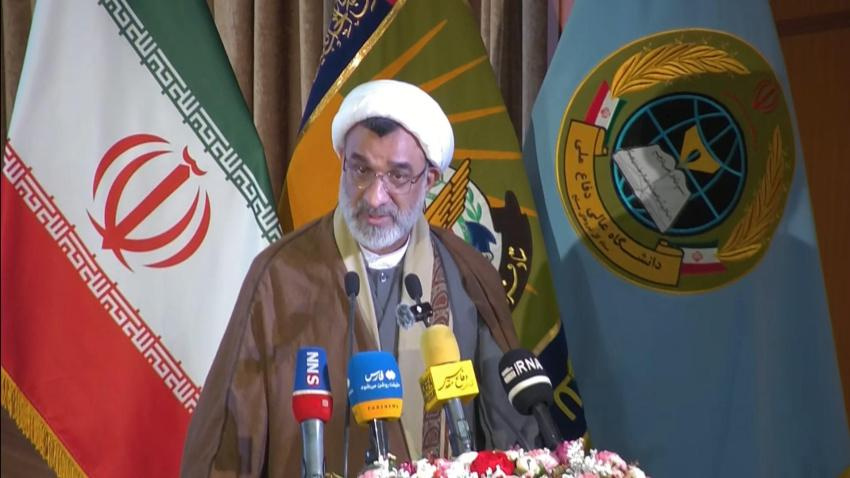Advocacy for Indigenous Theories in Contrast to Western Theories

According to a report from the Center for Communications and International Relations, a ceremony honoring Research Week and unveiling successful theories was held on Tuesday, December 18, with military and civilian officials in attendance at the Supreme National Defense University.
During this ceremony, Hojjatoleslam Abdolhossein Khosropanah, Secretary of the Supreme Council of the Cultural Revolution, expressed appreciation for the actions taken and the new theories introduced at the Supreme National Defense University. He provided explanations to support and strengthen this scientific initiative as follows:
When the topic of theorizing arose, various debates emerged in universities, with many doubting that such a day would arrive. Not only did they express disbelief, but they also denied the possibility of theorizing altogether, suggesting we would need three years just to understand the theories of Giddens, Parsons, Habermas, and the philosophies of Kant, Descartes, Spinoza, and Malebranche. They believed that even if a hundred years passed, we could only begin to grasp the distribution of these ideas.
However, various sessions were organized that encouraged critical thinking, followed by discussions on the philosophy of science and other relevant topics. Thankfully, a group of the country's scientific institutions, military, defense, and security universities and research centers held numerous promotional sessions and theory-building platforms. Today, we are witnessing the success of four theories as a result.
On the surface, it may appear that these four theories were merely proposed by researchers or scholars, reviewed in sessions by critics and judges with rigorous critiques. However, these theories possess both outward and inward aspects. The inward aspect reflects the lifelong dedication of these esteemed professors to thought, teaching, and research. I have briefly reviewed some of these theories. One, presented by Brigadier General Safavi, showcases his extensive academic and research experience gained during the Holy Defense. This innovative theory holds potential benefits for other countries as well. Another is the "Insightful Eye" theory, which focuses on modern information dominance—an important topic developed through the tireless efforts of Dr. AliZadeh and Dr. Abbasi. Additionally, the theory of the “Geopolitical Space of Air Power,” introduced by Dr. NasirZadeh, is a significant achievement, rooted in his extensive experience and contributions during the Holy Defense. Lastly, the theory of “Citizens' Right to Moral Security,” presented by Dr. Mohsen Esmaeili, stands as another notable contribution.
In explaining the success of these theories, I have identified three key factors. The first is epistemological; anyone aiming to theorize must first understand what a theory entails. They should be familiar with different types of theories—descriptive, prescriptive, fundamental, applied—as well as the theoretical foundations and methodologies involved. Beyond mastering the subject matter, they should also grasp the philosophy and history of that field of knowledge. The second factor is psychological—the courage to think critically and challenge existing ideas. As I noted, some believed we were not in a position to create theories, insisting that we first needed to understand Western theories. While familiarity with these theories is essential for proposing a cultural theory in opposition to thinkers like Foucault, Habermas, Giddens, and Parsons, the psychological courage to critique and develop original ideas is crucial. Without this, progress is hindered. Motivational factors and legal support are also necessary; once a theory is accepted, it should be included in textbooks, published globally, and translated into various languages. The third factor is sociological.
As these esteemed professors' theories emerge from years of teaching, research, writing articles, supervising numerous theses, and practical experiences, it is essential that they also draw upon their work experience in both production and theory development. Therefore, it is crucial for theorists to utilize their professional experiences and subject them to the scrutiny of others. For instance, the idea of promotional chairs was mine. During my responsibility for organizing these chairs, many opposed even the term "theorizing."
I now emphasize to the officials of the chair support committee that they should not complicate the promotion process, which risks becoming less beneficial over the years. Let every researcher, even those whose articles have not yet been published but possess scientific ideas and insights, have the opportunity to present their work for critique.
One of the tenets of governance, science, technology, and the production of knowledge is facilitation. However, we should not hastily label something as "theory." When someone declares, "I have an idea that I wish to expose to criticism," we must allow that critique to occur. The best way to address doubts is to hold promotional chairs, as placing theories under scrutiny can foster sociological factors that lead to theory realization. I hope, with the efforts of our colleagues, this goal will be achieved.



Your Comment :